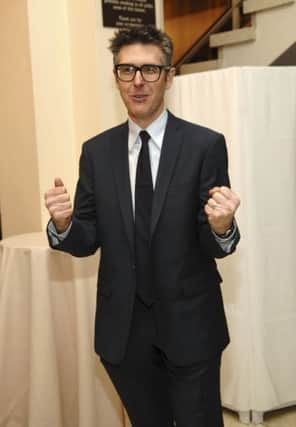Martyn McLaughlin: Podcasts are window into the weird and wonderful


I have long considered myself an avid radio listener. It is a habit ingrained by weekend afternoons in my grandfather’s kitchen, where after a daunder back from the bookies, we would gather round the wireless and listen intently to proceedings from Ascot or Newmarket, where the rising pitch of the commentators vied for attention with the rush of hooves and the desperate, hopeful shouts of the crowd.
I should probably count myself lucky that I never developed an affinity for the gee-gees as a consequence, but I will always be grateful for that early introduction to a medium that felt more immediate than television ever could.
Advertisement
Hide AdGrowing up with one foot in the analogue age, I kept the flame burning, and with the advent of the internet and the proliferation of digital radio stations, my habit became hopelessly and permanently entrenched. I have lost count of sleepless hours given over to Ira Glass and John Hockenberry on National Public Radio’s Talk of the Nation, discussing obscure issues in a distant country in a way that felt relevant and intimate.
Glass, of course, went on to create This American Life, a radio show which morphed into one of the world’s most popular podcasts. Even today, each episode is downloaded by around 2.5 million people. If that particular show’s success is well established, it would appear the popularity of its medium has yet to peak.
The latest analysis by Rajar, the official body in charge of measuring radio audiences in the UK, shows that as of this spring, some six million adults across Britain listened to at least one podcast a week.
That number might appear relatively small – just 11 per cent of the population – but when you assess it the proper context, its scale – and growth – is really quite something. Only last year, the number stood at just 4.7 million, and the number of people now downloading podcasts now outstrips the reach of BBC Radio 5 Live.
Such statistics have led to 2018 being hailed by the BBC as the year of the “podcast boom”. Such a bold prophecy may be intended as self-fulfilling, at least on the BBC’s part. In March, the corporation announced the appointment of its first-ever podcast commissioner, Jason Phipps, and it clearly believes it can build on the 240 million annual downloads of its programmes.
It, along with other broadcasters and media companies, faces a stern challenge in attracting a younger demographic who do not consume their media via linear channels, and podcasting is one the most obvious areas to focus on.
Advertisement
Hide AdRecent research by Acast, one of the main competitors to iTunes as the world’s leading podcast platform, found that two thirds of listeners are aged between 16 and 34. What is more, nearly a fifth of them have only started listening in the past six months.
The success of the BBC’s evolving podcasting operation alone will not solve that problem, but it is a start.
Advertisement
Hide AdIt is hard, however, to see the projected ‘boom’ coming to pass. Podcasting is hardly a new, emerging medium. In one form or another, it has been a staple of our media diet for well over a decade. iTunes first started collating a directory of podcasts as far back as 2005, when the term was named as the Merriam Webster dictionary’s word of the year. Within the space of 12 months, the comedian, Ricky Gervais, helped propel the medium into the public consciousness, with millions of users downloading his comedy shows. For a good few years, the podcast charts were dominated by such high-profile figures looking to emulate Gervais’s success. And while the podcasting world is still inhabited by any number of celebrities, its greatest treasures are to be found elsewhere.
In the past few days, I have listened to a 50-minute documentary about the economics of US dentistry, an hour-long interview with Kenney Jones, the former drummer with the Small Faces, and a two hour-long show devoted entirely to the 1978 arcade game, Space Invaders.
Slowly but surely, such esoteric listening choices have displaced live radio as my audio go-to. I subscribe to more than 70 different shows, and on an average week, I will listen to around 12 hours of programming.
Over the past year, the lion’s share of this has consisted of podcasts which focus on US politics, such as FiveThirtyEight, Pod Save America, Trumpcast, Trump Inc, all of which provide incisive takes on the Trump administration.
But so too, my podcast diet is supplemented by an ever-widening spectrum of programmes that embrace niche subjects.
On the one hand, it includes the likes of Trade Talks, a weekly insight into international trade deals, and The Tip Off, which interviews leading journalists about how they came across some of their biggest stories.
Advertisement
Hide AdOn the other hand, it takes in Wrestle Me, where comedians Marc Haynes and Pete Donaldson revisit every WrestleMania event from 1985 onwards in chronological order, and Cult of Geshcast, in which two Glaswegian friends, Gavin Spence and Phillip Maddison, discuss various cults and sects through the ages.
These are my niche interests, but whatever you are interested in, or even curious about, chances are there is a podcast out there for you. There might not be a boom in 2018, but with the bewildering choice of programmes out there, it’s hard to see how podcasts will fail to become an increasingly prominent part of our media landscape.
